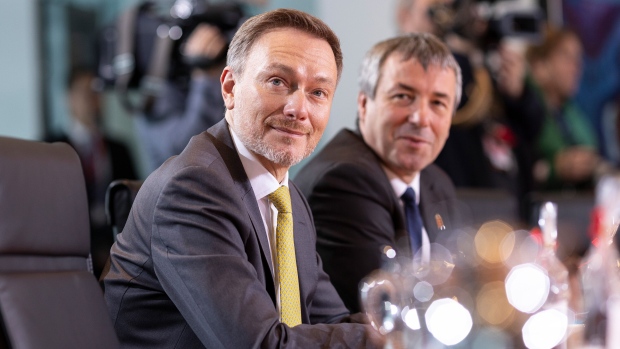Dec 6, 2023
German Budget Turmoil Handcuffs Lindner on EU Fiscal Rules Deal
, Bloomberg News

(Bloomberg) -- German Finance Minister Christian Lindner’s budget crisis at home is hampering his ability to strike a compromise over European Union fiscal rules in Brussels, according to people familiar with the matter.
With the coalition in Berlin still struggling to agree on public-finance plans for 2024, he’s unlikely to cede much ground in talks this week with other national counterparts, said the people, who declined to be identified because they’re not authorized to speak publicly.
Lindner’s difficulty is that he can hardly play the role of a fiscal hawk over spending in Germany while compromising on what he sees as softer EU rules than were previously in force, according to the people.
He and fellow EU finance ministers are in the final stages of negotiating a reform of the bloc’s regime limiting debt and deficits, which is set to kick in again in January after years of suspension to cope with the pandemic and then the fallout from Russia’s attack on the Ukraine.
The Spanish presidency of the EU has put forward a concrete proposal for a discussion in Brussels on Thursday evening and Friday, which accommodates Germany on many crucial points. Germany sees a “50-50 chance” of reaching an agreement by Friday, according to German officials involved in the negotiations.
EU Tussle
If Lindner holds to his position against indebted countries such as Italy and France that want a less restrictive interpretation of the rules, the matter may end up with the EU heads of state in mid-December.
That’s a scenario German Chancellor Olaf Scholz is keen to avoid because that gathering already has enough other issues to solve, according to people familiar with the matter. He has given Lindner the green light to finalize the talks and sees no big hurdles left from the chancellery’s point of view, the people said.
But before Lindner can tackle the Growth and Stability Pact in Brussels, he faces tough negotiations in Berlin.
At a top-level meeting in the German Chancellery on Tuesday night, the coalition was unable to agree on a solution to solve its crisis by plugging a €17 billion ($18.3 billion) hole in its 2024 budget. With talks continuing on Wednesday, there is still time to reach a deal before the meeting of EU finance chiefs starts.
In mid-November, the country’s top court ruled that the allocation of €60 billion from one off-budget pot to another was unconstitutional.
Domestic Distraction
The fact that Germany’s budget turmoil is a diversion for the country’s European agenda, has already been noted in Brussels. EU Budget Commissioner Johannes Hahn said last week that domestic issues are “distracting” German politicians on the bloc’s support of Ukraine.
“I hope there is an understanding in Berlin that there is a particular serious responsibility of the biggest economy of the EU and without their significant engagement we will not come to an agreement,” he told reporters last week.
Even if there’s a budget agreement in Berlin, an EU deal is far from certain. France has voiced concern that some rules might be too rigid.
If EU finance ministers fail to reach a deal this week, the discussion could be kicked up to leaders — meeting in Brussels Dec. 14-15 — to try to unblock talks, but in the end the legal approval is done by the economic and financial affairs council. The proposal needs to be agreed upon with the European Parliament too.
While the year-end deadline is self-imposed, French Finance Minister Bruno Le Maire has highlighted a December deal is essential for the EU’s credibility. The old fiscal rules will come back into force on Jan. 1, but capitals want to leave enough time to put in place a legislative reform ahead of EU parliament elections in June.
--With assistance from Michael Nienaber, James Regan, William Horobin and Alessandra Migliaccio.
©2023 Bloomberg L.P.


